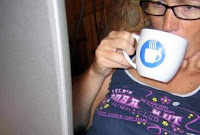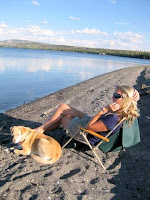 I can spend the entire day on the computer. As a matter of fact, that’s what I did in my last job. I was always on the computer or phone. The computer, preferably. I am not much of a phone talker. I can do an entire blog on this, but not today.
I can spend the entire day on the computer. As a matter of fact, that’s what I did in my last job. I was always on the computer or phone. The computer, preferably. I am not much of a phone talker. I can do an entire blog on this, but not today. Since I have been home, I can’t go but a few hours away from the computer. It’s a little sad. OK, a lot sad. I seriously need to spend more time outside. I will in the very near future. But for now, I’m chained.
I look at the headlines, “special on a vacation," “how to retire a millionaire”(still reading this one…will get back to it), political blah blah blah’s, who wore what where, how to retire …oops, went back to the millionaire article… You get the point.
People have told me to stop and wait to see what the “universe” presents to me. How can I see through all of the clutter? I just got a glass of water from my refrigerator and it overflowed because I was looking at my Burts bees hand wash by the sink and wondered why it cost so much. And, why did I buy it? I think of stuff like this all of the time. I am that person who books airfare and goes back online every day to see if it went up or down just to torture myself.
The Universe. I listen. I say yes.
I found a new hairdresser once she asked me to be her my space friend, I met some amazing people in person that I met online, I found a career online…wait, I see a trend here.
How did “we” function pre-internet? So many things experienced in life are a direct result of the internet.
I learned how to surf (literally), found a job, went to a new restaurant, reviewed one, found a campsite, toured a city, paid taxes, read the newspaper, saw what friends are up to, made vacation reservations, reconnected with friends, and the list goes on and on…
Maybe the answer to what the universe will give you is stuck in this little box you are typing into. What have you found online that has changed your life?
Seriously. I am not talking about the shoes you found on zappos. However, those shoes could have motivated you to work out, sign up for the race, and met the person of your dreams. Do they even sell running shoes? Humm… need to finish that article.
I would love to hear your story. Maybe what you share might help another person realize their dreams. For me, it all started when I Googled “teardrop trailer.” That was on January 2nd, 2008.





